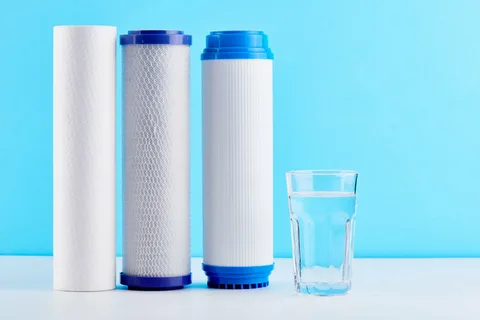Water filters come in various types, each designed to tackle specific contaminants and improve water quality differently. Activated carbon filters are well-known for their ability to remove chlorine, volatile organic compounds (VOCs), and other chemicals, which can enhance your water’s taste and odour. Reverse osmosis systems are highly effective at removing a broader spectrum of contaminants, including heavy metals, nitrates, and fluoride, by pushing water through a semi-permeable membrane.
Ultraviolet (UV) filters utilise UV light to neutralise harmful microorganisms such as bacteria and viruses, making them a great option for those concerned with biological contaminants. Thanks to their small pore size, ceramic filters excel at filtering out sediments, bacteria, and other pathogens. Best Water Filter type has benefits and potential drawbacks, making it crucial to assess your specific water quality issues to determine which filter will be the most effective for your home.
Significance of Water Filters with Certification
When selecting a water filter, it is crucial to ensure the product carries relevant certifications. These certifications indicate that the filters have undergone rigorous testing and comply with industry standards for contaminant removal. Filters certified by reputable organisations such as NSF International or the Water Quality Association have been tested to ensure they effectively eliminate specific impurities, providing safe and clean drinking water.
Certified filters ensure the manufacturer’s claims about the product’s performance have been validated. This validation gives you confidence in the filter’s ability to provide the desired level of water purification. Moreover, these endorsements typically detail the range of contaminants the filter can remove, making choosing a filter that meets your specific needs easier.
By opting for a filter with recognised certifications, you can be confident in its quality and effectiveness. This ensures your water is free from harmful contaminants, contributing to better health and well-being. Therefore, always check for these important endorsements when selecting a water filter to ensure you make an informed and safe choice.
Choosing the Capacity and Flow Rate That Suits Drinking Water Filter
Selecting a water filter with the right capacity and flow rate is crucial to ensure it meets your household’s water consumption needs. Consider the number of people in your household and their daily water usage.
Higher Capacity Filters
For larger households, selecting a Drinking Water Filter with a higher capacity is essential to maintain a steady supply of purified water. This ensures your household’s water needs are consistently met, even during peak usage.
Flow Rate
Another crucial factor is the flow rate, which indicates how quickly water is filtered. A higher flow rate is ideal for households with high water demands, ensuring an uninterrupted clean water supply. Look for models that balance adequate capacity and an efficient flow rate to suit your family’s needs.
Peak Usage Times
Consider the peak times when water usage is at its highest, such as mornings or evenings. Ensure the filter can cope with these demands to avoid any interruptions in your water supply. Some filters come with adjustable settings, allowing you to customise the flow rate according to your requirements.
Future-Proofing
Opting for a model that aligns with your current and future needs will ensure you always have a reliable source of clean water. Ensure the filter system you choose is capable of meeting your daily needs and is easy to adjust if your household size or water consumption habits change.
Practical Considerations
Choose a filter system that is easy to maintain and adjust. This will make it more convenient to ensure optimal performance and longevity. Reputable brands often provide additional services, such as customer support and replacement parts, which can be beneficial in the long run.
Evaluating System Compatibility with Your Setup
Evaluating system compatibility involves ensuring that your chosen water filter can seamlessly integrate with your home’s existing plumbing. Certain filters may require specific fittings or additional space, so confirming these requirements before purchasing is crucial. For instance, some filters might need special connectors or adapters to fit your current setup, and it’s important to check these specifications to avoid any installation hassles.
Additionally, it would help if you opted for filters that offer versatile installation options. Under-sink models are great for homes with limited space, as they can easily fit into tighter areas. Countertop models, on the other hand, require minimal plumbing alterations, making them easier to install and maintain.
Another critical aspect to consider is the filter’s water pressure compatibility. Some systems require a minimum pressure level to function effectively, and if your home’s water pressure fails to meet this requirement, the filter might not perform optimally. Ensuring the filter matches your home’s water quality and pressure specifications will help you avoid performance issues. This compatibility check is essential to ensure the filter works efficiently and provides the clean, safe drinking water you need.
Weighing Cost against Energy Efficiency
When considering a water filter, evaluating both the initial investment and the long-term operating costs is important. Some models may come with a higher price tag, but their advanced features can result in savings over time. Look for filters that boast energy-efficient technologies, which can reduce power consumption and lower electricity bills.
Energy-efficient models often incorporate features such as automatic shut-off systems, which can prevent unnecessary energy use. Filters that require less frequent part replacement can also contribute to cost savings. It is also worth investigating if the filter has reusable components, as these can significantly cut down on maintenance expenses.
Another factor to consider is the cost of replacement filters and their availability. Some water filters have proprietary parts that may be expensive or difficult to source, affecting the overall cost-effectiveness. Opting for a model with readily available and reasonably priced replacements ensures you can maintain your water filter without breaking the bank.
Finally, consider the potential savings on bottled water. By investing in an efficient water filter, you can reduce or eliminate the need to buy bottled water, which can be both costly and environmentally damaging. Balancing these elements will help you select a water filter that provides excellent value for money while being mindful of energy consumption.
Simplicity of Maintenance and Changing Water Purifier for Home
Maintaining your water purifier should be straightforward to ensure continuous, optimal performance. Look for filters that have easy-to-access parts and straightforward disassembly processes. This makes routine cleaning and maintenance much less cumbersome. Filters with clear replacement indicators can also be beneficial, as they alert you when it’s time for a change, removing any guesswork.
Additionally, consider the cost and availability of replacement filters. An expensive or difficult-to-source filter can become a hassle in the long run. Some systems offer reusable or washable filters, which can reduce ongoing costs and make the maintenance process more sustainable.
Ease of maintenance also includes understanding the frequency of filter changes required. This can vary based on the type of filter and the water quality in your area. Opt for models with user-friendly manuals and customer support to assist with issues.
Lastly, check if the filter system includes features such as automatic shut-off during filter changes or built-in maintenance reminders. These features can simplify upkeep and ensure your Water Purifier for Home remains efficient without constant attention. By selecting a water filter that emphasises ease of maintenance, you can ensure that it remains an effective and hassle-free solution for providing clean water in your home.
Conclusion
Choosing the Best Water Filter can significantly enhance your home’s water quality, catering to specific needs, whether removing chlorine, heavy metals, or harmful microorganisms. Certified filters assure their effectiveness, aligning with industry standards and eliminating doubts about performance claims. Capacity and flow rate considerations ensure that your household’s water needs are met efficiently without compromising quality. Ease of maintenance and the availability of replacement parts play a vital role in ensuring your filter remains effective over time without being a constant chore.
FAQs
What is the water filter for removing chlorine?
Activated carbon filters excel at removing chlorine and enhancing the taste and odour of your water.
Do all Best Water Filter require professional installation?
No, many Best Water Filter are designed for easy installation, making it simple for homeowners to set up without needing professional help.
How often should I change my water filter?
The frequency of changing your water filter depends on the specific type and your water usage. Typically, filters need replacing every 3 to 12 months.
Are more expensive water filters always better?
Price is not always an indicator of quality. When selecting a water filter, it is important to consider features, certifications, and long-term savings.
Can a water purifier remove all types of contaminants?
No single filter can eliminate every contaminant. Therefore, it is essential to choose a filter that addresses the specific impurities in your water supply.
| Related Business Listings |
| Contact Directory |
| Local Business Profiles |




